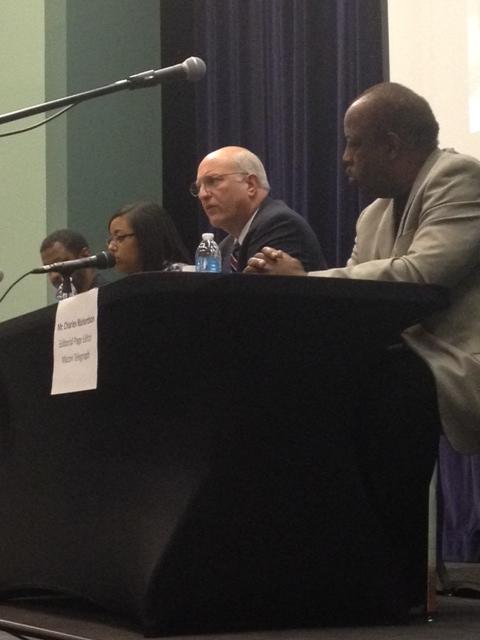
Section Branding
Header Content
Cops Versus Community: Bibb Sheriff And Black Men Talking To Each Other
Primary Content

More protests took place across the country Wednesday night after a New York grand jury decided not to prosecute a white police officer in the death of Eric Garner who died in July after being placed in a choke hold. U.S. attorney general Eric Holder has announced a federal investigation into the death.
President Obama wants a "sustained conversation" on the relationship between police and the communities they serve, particularly communities of color. This after the Ferguson riots over the death of Michael Brown, an unarmed African American teenager killed by a white police officer.
In Macon that conversation has been going on since the Trayvon Martin ruling over the summer.
At a panel discussion titled Cops Versus Community, held in October at Middle Georgia State College in Macon, several prominent African American people joined Bibb County Sheriff David Davis to talk about race relations.
The flashing lights of a police car can make drivers irritated at the inconvenience or maybe anxious as they get ready to plead their case. But African American men have different worries when confronted by the police: Fear and mistrust.
Charles Richardson, editorial page editor at The Telegraph, explains what he says when he comes face to face with police. "Yes sir, no sir. I am no threat to a police officer. Never have been," said Richardson before the audience full of students, community members and the police.
Richardson remembered a man in the 1970s by the name of Richard Pryor who famously said during a stand up routine "I am reaching into my wallet!”
The late comedian joked in 1974 about the fear black men have in dealing with the cops.
Michael McMorris, an African American professor at Middle Georgia State College who was a former law enforcement officer told the audience
"It still bothers to this day when I am stopped, not because I’m speeding and I know it, but it bothers me because I don’t know if I’m going to be able to walk away from that particular encounter."
It's that fear that Andre Nicholson wanted to talk about and that's why he organized the discussion. The professor of communication studies explained that it all started when a student told him he didn’t like the police. "That sends up a red flag for me because when you don’t like someone, when you don’t trust someone that is an easy road to not have respect for someone.
When you don’t respect someone and then you interact with them, it’s very easy for that to escalate to another level. And I can kinda see how our young African American men who don’t have respect for authority get into altercations with police," Nicholson said.
Conversations like the one at Middle Georgia State are happening in other parts of Georgia like Savannah and Valdosta, but they have been reactive to situations in those communities. Macon has tried to be proactive – including the police. Bibb County Sheriff David Davis has been visible at the few protests and rallies after both the Trayvon Martin ruling and now Michael Brown.
During the Middle Georgia panel discussion, Davis, the only white man on the stage, told an audience full of young black men what to expect if they are ever stopped by police.
"The deputy, or law enforcement, is going to say you’re driver’s license and what are you doing here. You want to keep a calm demeanor. In your mind you may want to say this joker is hassling me, especially in the middle of the night, or in a dangerous place. If you feel like something is out of the way there are ways to address that," he said.
For many African American families this is called “The Talk” and Davis readily admits that “The Talk” is something he never had with his parents and he’s never given to his kids.
Davis is establishing a new kind of “talk” with his officers though. He says officers need to put themselves in the position of men of color and understand why they maybe distrustful. He also says a white officer needs to understand that every African American that you stop has not just robbed a store up the street.
Tags: Leah Fleming, Bibb Sheriff David Davis, Charles Richardson The Telegraph of Macon, young black males, Trayvon Martin, macon response to trayvon martin case, eric gardner, macon response to eric gardner case
